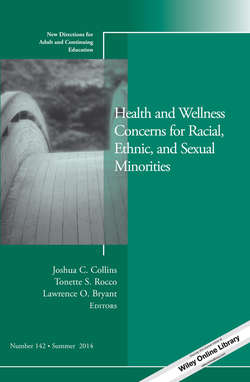Описание книги
Minority status in the United States often accompanies diminished access to education, employment, and subsequently health care. This volume explores factors that have contributed to health disparities among racial, ethnic, and sexual minorities. Focused on developing strategies for understanding these disparities and promoting wellness in minority communities, the authors highlight social forces such as racism, ethnocentrism, sexism, and homophobia, which continue to influence not only access to and quality of care but also perception and trust of health care professionals. The authors identify several common themes, including the importance of communication, intentional and unintentional discriminatory structures, and perhaps most significantly, the role of culturally relevant learning sites. This is the 142nd volume of the Jossey Bass series New Directions for Adult and Continuing Education. Noted for its depth of coverage, it explores issues of common interest to instructors, administrators, counselors, and policymakers in a broad range of education settings, such as colleges and universities, extension programs, businesses, libraries, and museums.
